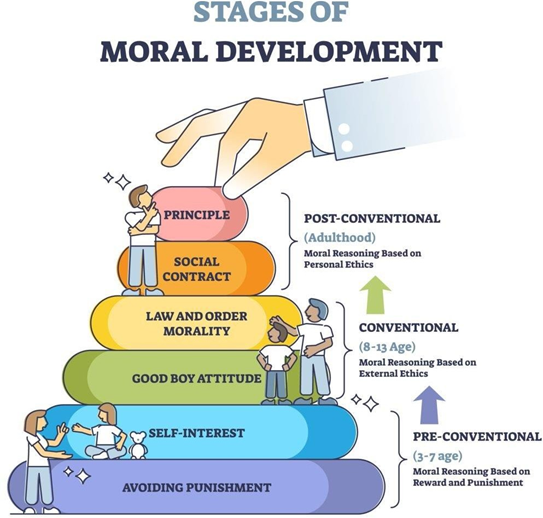The nurse explains to parents of school-age children that according to Kohlberg's theory of moral development, their child is at the conventional stage of moral development. Which is the nurse's best explanation for the motivation for school-age children to follow rules?
They follow rules out of a sense of being a "good person."
They follow rules out of fear of being punished.
They follow rules in order to receive praise from caretakers.
They follow rules because it is in their nature to do so.
The Correct Answer is A
A. They follow rules out of a sense of being a "good person.": According to Kohlberg, at the conventional stage of moral development, individuals are motivated to follow rules and laws to maintain social order and to be perceived as good members of society.

B. They follow rules out of fear of being punisheD. Fear of punishment is more characteristic of the preconventional stage of moral development, where individuals make moral decisions based on avoiding punishment or seeking reward.
C. They follow rules in order to receive praise from caretakers: Seeking praise from caretakers may influence behavior, but it does not reflect the underlying motivation for following rules according to Kohlberg's theory.
D. They follow rules because it is in their nature to do so: While some individuals may have a predisposition to follow rules, Kohlberg's theory focuses on the moral reasoning behind rule- following rather than inherent tendencies
Nursing Test Bank
Naxlex Comprehensive Predictor Exams
Related Questions
Correct Answer is A
Explanation
A. Body weight: Body weight is the most reliable indicator of fluid loss, as changes in weight directly reflect changes in fluid balance. Monitoring weight is essential for assessing dehydration and guiding fluid replacement therapy.
B. Skin integrity: While changes in skin turgor and skin integrity can be indicators of
dehydration, they are less reliable in infants, especially if they have certain skin conditions or are very young.
C. Respiratory ratE. Although increased respiratory rate can occur as a compensatory mechanism for metabolic acidosis associated with dehydration, it is not as reliable as changes in body weight for assessing fluid loss.
D. Blood pressurE. While blood pressure may be affected by severe dehydration, it is not as sensitive or practical as monitoring body weight for assessing fluid loss in infants.
Correct Answer is B
Explanation
A. Inspection, percussion, palpation, auscultation: This sequence starts with visual inspection, followed by percussion (tapping the body to assess underlying structures), palpation (using the hands to feel for abnormalities), and finally auscultation (listening with a stethoscope to assess sounds such as heart, lung, or bowel sounds). However, palpation is usually performed before percussion.
B. Inspection, palpation, percussion, auscultation: This is the correct sequence for performing a physical examination. It begins with visual inspection, followed by palpation to assess for
tenderness, masses, or other abnormalities, then percussion to evaluate the density of underlying structures, and finally auscultation to listen to internal sounds.
C. Palpation, percussion, inspection, auscultation: This sequence starts with palpation, followed by percussion, then inspection, and finally auscultation. However, inspection is typically performed before palpation in a physical examination.
D. Inspection, auscultation, palpation, percussion: This sequence starts with visual inspection, followed by auscultation, palpation, and percussion. While auscultation often follows inspection, palpation is usually performed before auscultation.
Whether you are a student looking to ace your exams or a practicing nurse seeking to enhance your expertise , our nursing education contents will empower you with the confidence and competence to make a difference in the lives of patients and become a respected leader in the healthcare field.
Visit Naxlex, invest in your future and unlock endless possibilities with our unparalleled nursing education contents today
Report Wrong Answer on the Current Question
Do you disagree with the answer? If yes, what is your expected answer? Explain.
Kindly be descriptive with the issue you are facing.
